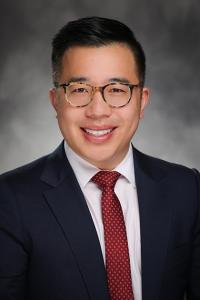Completely Pain-Free from Sciatica: A Young NY Professional’s Minimally Invasive Spine Surgery for Disc Herniation
For Rebecca Kaplan, a busy New York professional, dog mom, and loving aunt of seven, back pain had been a constant in her life since childhood. “I remember randomly experiencing crippling spasms in my lower back as a child that would render me breathless. However, because it always resolved, I never went to see a doctor,” she says.
Last April, Rebecca felt that familiar twinge in her lower back. But instead of it getting better with rest, it continued to get worse. “I would have days where the simple act of walking to the bathroom would bring me to tears. I knew then that this was more than just some simple back pain and I needed to see a doctor,” she says.
Rebecca initially saw a physiatrist who ordered an X-ray and MRI which revealed a L5-S1 disc herniation. She was referred to physical therapy, which she did for several months but saw no improvement. In July, she had a spinal epidural injection with hopes of it helping the pain, but she had no response to it and went into another debilitating flare. By the end of August, the back pain had somewhat subsided, but she started to feel pain and tingling in her right leg.
The leg pain continued to get more severe, eventually reaching the point where she could no longer commute into her office in midtown Manhattan. At that point, Rebecca switched her care to Columbia, and saw physiatrist Dr. Samantha Erosa for a second opinion. Dr. Erosa ordered another MRI, which revealed that the herniation had gotten more severe. “I felt so defeated. I had spent so long limiting my movement and engaging in physical therapy just to be told the herniation had gotten worse,” Rebecca says.
After being evaluated by Dr. Erosa, Rebecca decided to investigate surgical options and reached out to Dr. Andrew K. Chan, a neurological spine surgeon at Columbia. Before jumping straight to surgery, Dr. Chan put her on six weeks of rest with no bending, lifting, or twisting. She also had a repeat MRI as well as an electromyography (EMG) to confirm the source of her leg pain. After six weeks, the leg pain had become intolerable, and she could barely leave her house. She was offered several conservative treatment options, including trying another spinal epidural and completing another course of physical therapy; however, Rebecca decided that pursuing surgical treatment would be her best option for her long-term.
Says Dr. Chan, “Many disc herniations improve with time and nonoperative treatments, such as medication, injections, and physical therapy. Upon reviewing Rebecca’s case, it was clear her symptoms were not improving after 3 months of suffering. Rebecca reached a state where she had severe disability and a poor quality of life despite nonoperative treatments. At this point, surgery to decompress her nerve was a reasonable next step.”
Rebecca underwent a L5-S1 minimally invasive (MIS) tubular microdiscectomy on November 20, an MIStechnique that utilizes a small incision and a series of tubes to dilate through muscle to get to the disc herniation and remove it. This is contrasted by a traditional open approach where the muscular tissue surrounding the spine needs to be dissected to the sides to get to the disc herniation. The procedure went smoothly and Rebecca was discharged from the hospital on the same day. “I went into surgery with horrible leg pain and woke up with no pain aside from minor soreness at the surgical site. My recovery has been great.”
Rebecca had had very little pain post-operatively and was able to manage the initial soreness with just Tylenol—avoiding opioid medications entirely. At six weeks post-surgery, she started physical therapy to rebuild the strength and mobility in the muscles she previously was unable to use for months. Rebecca is thrilled to report her back pain is totally gone. Now that she’s on the mend she’s looking forward to returning to see colleagues at office, socializing with friends, and spending time with family.
Rebecca wants patients to know, “Listen to your body and be your own advocate. If you aren’t satisfied with the care you are receiving, don’t be afraid to get a second opinion. Switching my care to Columbia was the best thing I could have done. I was terrified of having surgery; however, in my gut, I knew it was the right option for me after so many months of debilitating pain. Dr. Chan spent a lot of time explaining the procedure and answering my questions. After I scheduled my surgery, the continued support I received from him and his entire team pre- and post-operatively was incredible. Dr. Chan, his nurse practitioner Paytyn, and the entire neurological spine surgery team at Columbia truly changed my life for the better!”


